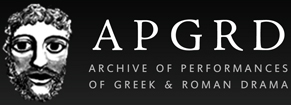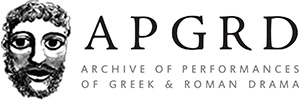Hybrid Conference
A two-day international conference, Aristophanes after Babel: Plutus in Translation from the Early Modern Period to the Present Day, will be held at the University of Grenoble on 30-31 May 2024, organised by Malika Bastin-Hammou, Giovanna Di Martino, and Micol Muttini, with the support of the Université Grenoble-Alpes, UCL and the APGRD (Oxford).
Aristophanes after Babel: Plutus in Translation from the Early Modern Period to the Present Day aims to examine the reception of ancient Greek drama in translation practices and theories from the early modern period forward. It is the fifth event in a series spanning the translation of ancient Greek drama in the early modern period. The series is the result of a collaboration between the Université Grenoble-Alpes, Oxford, Paris XIII, and UCL (see Translating Ancient Drama).
Registration
Registration is free but booking is essential: please register online via Eventbrite - this page includes the Zoom details for remote attendees.
Programme
Thursday 30 May
Maison des langues et des cultures,
Salle Jacques Cartier, University Grenoble Alpes
9.00-9.30 Registration and Coffee
9.30-10.30 Welcome and Conference Opening: Malika Bastin-Hammou (Grenoble), Giovanna Di Martino (UCL/APGRD), Micol Muttini (Grenoble), Centre ELAN (Élan Littératures et Arts Numériques), Nassim Mandhouj (Grenoble)
10.30-12.00 – Re(dis)covering Plutus – Chair: Giovanna Di Martino (UCL/APGRD)
- Hugo Martín Isabel (Universidad Complutense de Madrid): Ludovicus Puppius translates Plutus: the translation contained in the manuscript Matritensis 4697 BNE
- Pietro Totaro (University of Bari): A Neglected Translator of Aristophanes’ Plutus: Coriolanus Martiranus
- Micol Muttini (University of Grenoble): Digital Scholarly Editing and Aristophanes. The Renaissance Latin Plutus
12.00-2.00pm Lunch
2.00-3.00pm – Vernacularising Plutus I – Chair: Malika Bastin-Hammou (Grenoble)
- Simone Beta (University of Siena): Traduire Aristophane à Sienne: le Plutus de Giovambattista Terucci et Giuseppe Fabiani
- Francesco Morosi (University of Pisa): Translating Ideology? Aristophanes in Early Modern Translations
3.00-3.15pm Coffee Break
3.15-4.15pm – Vernacularising Plutus II – Chair: Micol Muttini (Grenoble)
- Cécile Dudouyt (University of Paris 13): First fragmentary translations of Plutus: a translation at the time of the Brigade
- Giovanna Di Martino (UCL): Aristophanes’ Wealth between Ireland, England and Italy (1500-1660)
4.15-4.30pm Coffee Break
4.30-5.30pm Plutus and the Search for Modernity I – Chair: Cécile Dudouyt (Paris 13)
- Stavroula Kiritsi (RHUL): The reception of Aristophanes’ Plutus in Dimitrios Paparigopoulos’ Agora (1871) (online)
- Alexander Hammar (University of Southern Denmark): Acting Athenian: Domestication, Foreignization, and Readership in the Earliest Danish Translation of Plutus
6.00-7.00pm Performance - Inventing the Comic Chorus MaCI, Live Arts Lab – C5
- Ploutos, dieu du Pognon (Compagnie TALMA, UNIL et la participation des étudiants du projet CHOROS, UGA)
7.00-8.00pm Drinks Reception
Friday 31 May
MaCI, Amphithéâtre
University Grenoble Alpes
9.00-10.00 Roundtable Discussion on the Thursday Performance
10.00-10.30 Coffee Break
10.30-12.00 Plutus and the Search for Modernity II – Chair: Micol Muttini (Grenoble)
- Anna Georgiadou (Independent Researcher): Aristophanes’ Plutus by Kostis Kolotas for the Cyprus Theatre Organisation (online)
- Davide Iengo (University of Pisa): Plutus in XX-century Poland: comparing Stefan Srebrny’s and Janina Ławińska-Tyszkowska’s translations
- Lucie Thévenet (University of Nantes): Quelques traductions contemporaines du Ploutos
12.-2.00pm Lunch
2.00-3.00pm Plutus in Contemporary Translation and Performance Practices – Chair: Giovanna Di Martino (UCL/APGRD)
- Alesia Mankouskaya (UCL): From Page to Stage: Visualization and Contemporary Interpretation of Text on Stage
- Martina Treu (IULM): Thirty years with Plutus (online)
3.00-3.30pm Coffee and Plenary
Contact
For any questions you may have, please contact:
Call For Papers: Deadline 1 December 2024
In After Babel (1975), literary critic George Steiner laid the foundation for Translation Studies and identified translation as a sine qua non of human communication. Since its introduction to the world stage in the late 1970s, Translation Studies has experienced a global expansion: once considered a marginal activity, translation is now regarded as a fundamental act of human communication. Indeed, there has never been a stronger interest in translation than there is today, and its study is taking place alongside an increase in its practice worldwide.
At the dawn of the Quattrocento, in Italy in particular, Aristophanes’ plays, lost after the fall of Rome and unknown to the Latin Middle Ages, were finally ‘rediscovered’. The proliferation of translations of ancient Greek drama functioned as the principal means of introducing the comic playwright to the high culture of Latin and vernacular Europe. Rather uniquely, the translation of Old Comedy falls within a number of areas of scholarly study, including philology, pedagogy, literature, and theatre. Aristophanes’ Plutus was particularly popular and played a significant role in the early modern education system (notably, it was the first comedy to appear in translation) and on the stage.
The translation processes at play in the different versions of Aristophanes’ comedies are of particular interest. Translators have had to deal with issues specific to comedy, including obscene language, political attacks, religious disrespect, humour, and topicality; in addition, Aristophanes’ plays contain references to people, objects, and institutions that were familiar to him and his original audience, but that are unknown to a modern audience. And yet, in spite of Aristophanes’ continued cultural relevance, modern scholars often overlook and forget his reception in translation.
This two-day conference brings translations of Plutus into focus, from the early modern period to the present: it aims at gathering scholars interested in the global reception of Classics and their translations into other languages. By examining Aristophanes through the eyes of his translators, we hope to be able to gain a better understanding of the different ways in which cultures, literatures, and languages have studied, appropriated, and recreated ancient Greek comedy. Rather than being tangential to the study of Aristophanes, this topic plays an integral role in how we comprehend and read this rich and ancient dramatic corpus today.
Possible topics include, but are not limited to, the following:
- Translation challenges and solutions (as evidenced in manuscripts, printed books, dedicatory epistles and other paratexts), including: translating ancient Greek poetic language and meter; transposing all culturally specific references in Plutus, and rendering comic humour and obscenity
- Translators as cultural mediators: investigating the translation practices adopted by interpreters, their evolution over time, and why translators adopted translational strategies in particular times and places to present Aristophanes’ Greek text to their audiences.
- A translation or ideology as an intentional alteration of the original for moral, religious, ideological, political, or other purposes
- From page to stage: translation theories and their application to translation practices in performance; translations of Plutus and their dramaturgical potential; translations of Aristophanes in theatres and other performance settings
- The role of translation in the creation of literature and in the establishment of a theatrical genre and its repertoire: Aristophanes’ translations and recreations of the comic genre
- Teachers’ and students’ approaches to teaching and learning Greek with Plutus in translation with Aristophanes in the classrooms
- Other topics: the relationship between translator, translation, Aristophanes, and the target public; the spatiotemporal circulation of translations; identifying Greek manuscripts and printed sources used by translators; gender issues; translators’ use and re-use of Plutus; cases of retranslation and relations with earlier translations; translations of Classical genres; translations that respond to Greek poetry with metrical innovations.
This conference will demonstrate the breadth and depth of the topic, as well as foster collaboration within and between fields. We invite paper proposals from postgraduate students, early career researchers and experts in any field.

